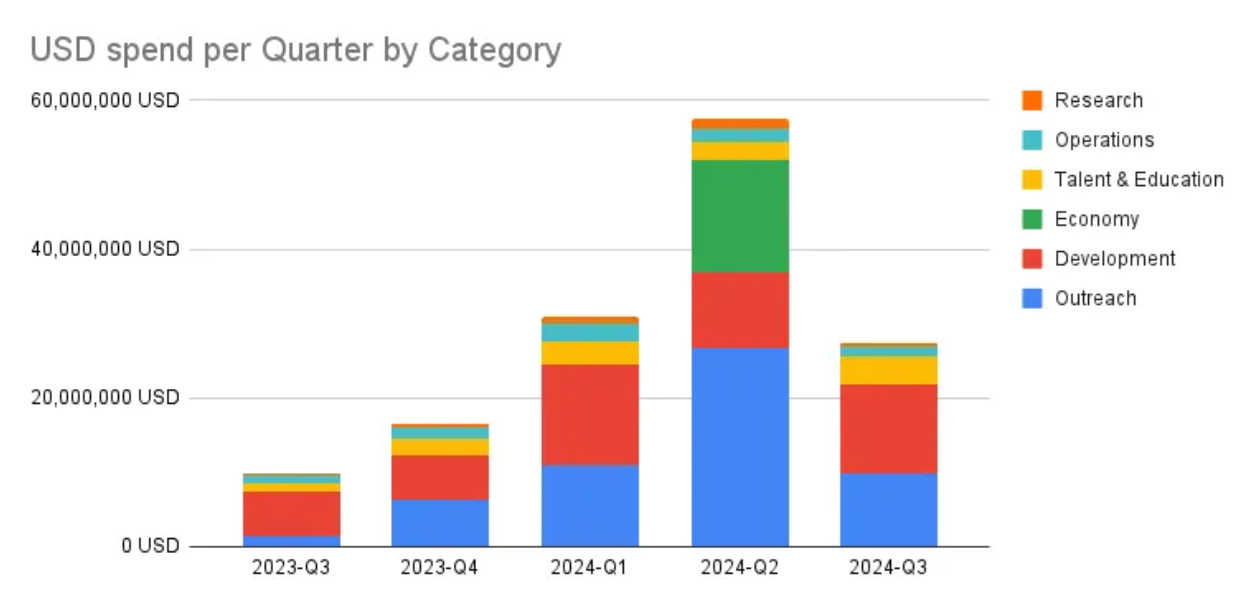2024 October Polkadot OpenGov Report

Polkadot’s unified strategy is beginning to take shape with Polkadot Cloud as the core infrastructure for Web3 applications and Polkadot Hub as the center for community and governance. This vision, recently introduced by Shawn Tabrizi, brings fresh focus to Polkadot’s marketing efforts as well as its broader goal of building a scalable, community-centered ecosystem. In this month's report, we dive into these topics, including Q3 Treasury spending, new proposals for bounty standards, the launch of Project Phoenix, and more.
Decentralized Budgeting
We published our latest Treasury Report for Q3 2024. This quarter saw a reduction in overall spending, with outreach dropping sharply, while allocations for development and education remained steady. The report also details updates like the treasury’s first active asset swap and recent DeFi activity. These shifts reflect a more cautious approach to spending, which aligns with our push for decentralized budget management across the network.

In this effort, we recently proposed a WFC proposal to set some basic standards for bounties. We hope that this proposal gains solid backing and that token holders reinforce these standards with their votes so that the network can establish a real culture of transparency and accountability around treasury funds. Organizing a decentralized budgeting strategy is still very experimental and not easy, but as Polkadot, we are the first community to even attempt it on this scale.
If we can get some standards in place, it will be easier for the network to delegate more responsibility to these departments. You can read more about this plan in our forum post. We are already working on the draft of the next WFC proposal, which will lay the ground for this transition. If everything goes as planned, the network can start routing funds to departments with designated budgets, eventually giving users a full picture of network budgeting with a bottom-up approach. Without a central decision-making body, these decisions have to come from the ground up. For more on this approach, check out the BASED budgeting post.
Back to the current WFC voting process. Technically, a simple 50%+1 vote could pass the proposal, but there are two issues with that understanding:
- Unity in the Network: If a proposal passes by just a few votes, it means the other half of the network is opposed. That is not the unity we are after.
- Building a Culture: We are building something to last here, a shared set of values only works with strong support from all participants.
So take your time with these ideas, get involved in the discussions, and show up with your thoughts and your votes. This is a project we can only build together.
Marketing Bounty Operational
The new marketing bounty has launched with nearly 84% approval, backed by over 58 million DOT in voting power. As OpenGov.Watch, we are excited to hold a curator seat on this bounty, and we’re committed to applying all bounty compliance standards here with support from the other curators.
Internal operations have begun, and the documentation and homepage are currently in the works. The bounty will start accepting proposals by mid-November, with payments expected to begin by the beginning of December.
We have already outlined our curator strategy as OGW: proposals will undergo high scrutiny, focusing on product-market fit, transparency, and prioritizing educational content and integrations over pure advertising. On top of this ‘individual’ approach, the recent discussions on Polkadot Cloud and Polkadot Hub introduce a more grand strategy for the network which is highly relevant for the marketing operations as well.
We recognize that frequent narrative shifts can challenge teams focused on outreach, but the Polkadot Cloud narrative is powerful. Adopting it early could make a strong impact, especially as this narrative could easily be stolen and adopted by other chains!
Project Phoenix - Next Phase for the Ambassador Program
A new ambassador collective, Project Phoenix, has been proposed thanks to the hard work of several current ambassadors following multiple community calls for network feedback. Voting on the proposal runs until early December, and, if accepted, the program is expected to launch by early 2025. The Project Phoenix manifesto emphasizes a return to community roots, drawing lessons from past ambassador programs, and prioritizing collaboration over competition. Key values include inclusivity, grassroots community building, and building a collective movement rather than a business-focused model.
The proposal introduces a rank-based membership system, mirroring the Technical Fellowship's code of conduct, with clear processes for promotions, demotions, and internal voting. You can check out more details in the summary document, view the full manifesto on GitHub, and stay updated with the roadmap. Remember, none of the ambassadors have received payment to date, and Project Phoenix itself is built entirely on voluntary effort.
Notable Mentions
-
Governance in Data: Parity’s DotLake team has released a report providing an in-depth, data-focused look at Polkadot’s governance since the launch of OpenGov, with statistics updated through October 2024. The report highlights key areas like voting behavior and trends, mapping out referendum details, and an overview of the Polkadot Fellowship. It also explains how the Decentralized Voices program has influenced decisions and offers insights into Bounties, showing major fund recipients and allocation. Packed with visualized metrics, this report is an excellent resource for anyone interested in the data-driven side of Polkadot’s governance.
-
New Editorial Board: The Polkadot main Twitter account’s new editorial board has been announced. The account, which was decentralized last year and successfully managed by Evan Thomas under a Web3 Foundation DF grant, is supported by a rotating editorial team funded through OpenGov. The treasury proposal backing the second term of the editorial board is currently passing by a wide margin.
-
Unified Address: The UX Bounty’s first commissioned project is slowly taking shape. Developed by Jakub Panik of the Hydration team, this project aims to unify address formats across the ecosystem, simplifying the user experience, reducing confusion, and minimizing the risk of misdirected assets. For a summary, check the Wish for Change proposal, or explore the UX Bounty's Notion page for further project details.
-
The Spammening: The Spammening is near! With approvals on Polkadot and Kusama, this event, initiated by established validator Amforc, is set to test network throughput by spamming transactions. This stress test will provide empirical data on transaction capacity, aiming to showcase Polkadot’s potential to outperform other blockchains under high demand.
-
Swipegov: Nova Wallet has launched SwipeGov, a new feature enabling users to swipe proposals as “aye” or “nay” for easier governance participation. After swiping through a few proposals, SwipeGov bundles them into a single on-chain transaction. The feature is also AI-powered, offering summaries and links to full proposals before each swipe.
Get Involved
- Follow OpenGov.Watch on X: @xcjeeper @alice_und_bob.
- Enjoying our direction? You can now easily delegate your votes to Jeeper on the Delegit Platform.